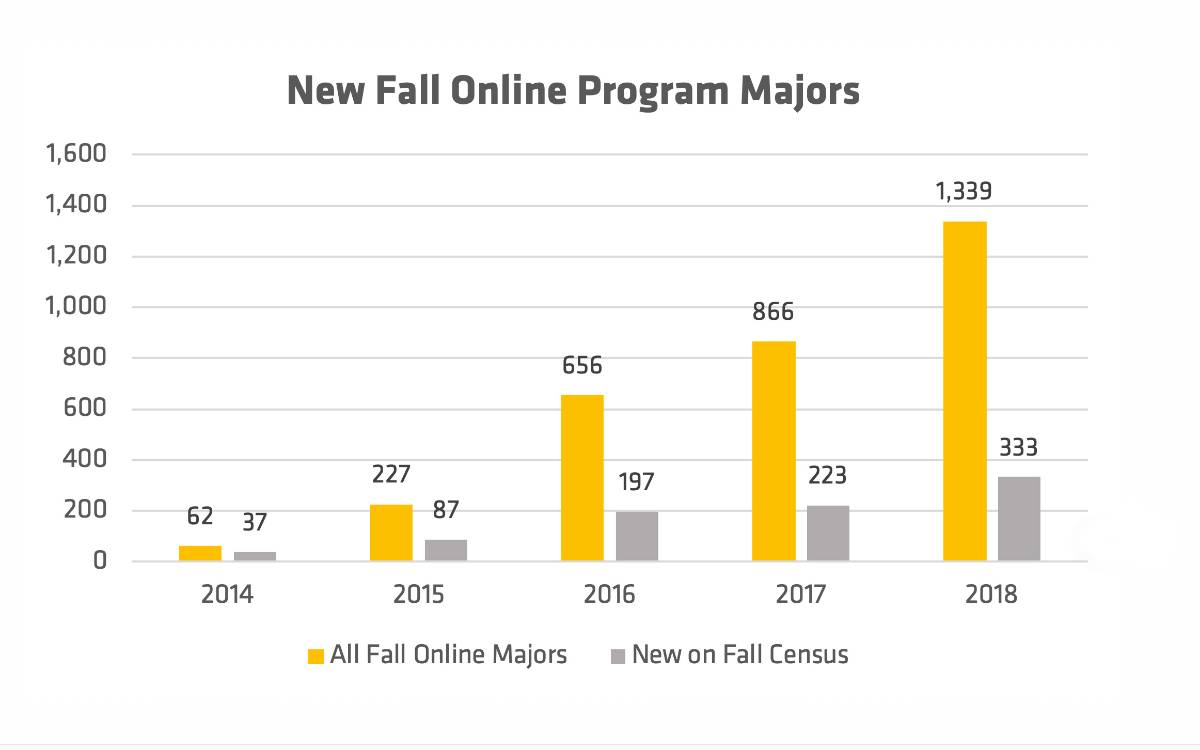In conjunction with the University’s Strategic Planning process, WSU has developed a Strategic Enrollment Management (SEM) plan for future growth. To stay informed on the progress toward our goals, each month we will provide the status of one of the goals and provide information for you to assist us in moving forward together.
SEM Goal 7 addresses the expansion of online program majors. Distance education provides options for students who are unable to come to campus because of location or time constraints, or who need greater flexibility in their schedules because of work or personal commitments. We continue to have strong growth in new students to WSU who are online program majors.
For fall 2018 we saw an increase of 49.3 percent over fall 2017, or 110 new additional online majors. WSU now has 11 undergraduate degrees, 11 graduate degrees, two undergraduate certificates and four graduate certificates that are fully online, and one undergraduate program that is a hybrid program (more than 50 percent of the courses are online).
Online Learning is working with departments across the university to explore how they can address the growing needs of our distance learning population by creating more fully online and hybrid programs.
In addition to administrative and enrollment support staff, the Office of Online and Adult Learning has six academic advisors who support our undergraduate programs in four colleges: Applied Studies (2), Barton School (1), Health Professions (1), Fairmount College of Liberal Arts and Sciences (2). There is also an online retention specialist who works with all undergraduate program students to ensure that they are getting the support they need to be successful students.

What can you do?
- Learn more about our online programs and staff.
- Take a Badge course to experience what it’s like to be an online student. See a list of Badge courses.
- For faculty:
a. Contact the Office of Online and Adult Learning as you begin planning an online or hybrid program or certificate so we can adequately support you through the process, even if you don’t think you need resource support.
b. If you have a fully online or hybrid degree program idea, including partial residential programs for those that require in-person experiences, discuss it with your colleagues in your department and invite the Office of Online and Adult Learning to your department meeting to discuss what support is available.
c. Attend a professional development opportunity to help enhance your ability to teach in an online classroom or provide online content through Blackboard more effectively. See a list of upcoming workshops led by Instructional Design and Access.
d. Consider making elements of your course online or teaching your course as a hybrid course in the future to reach students in need of more flexible course options.
e. Apply to be an Online Learning Faculty Fellow for the 2019-2020 year. Find out more information. - For staff and administration:
a. Consider ways in which your area can support distance learning students who cannot come to campus. The Office of Online and Adult Learning can help provide some options for adapting processes and policies.
b. Consider ways to include students at a distance when planning student activities and support programs. Examples include: turning a meeting or presentation into a web-based event; providing options to support students via telephone or web-conferencing; or providing a live-stream or recording where possible for guest speakers and special events. Consult with the Media Resources Center for requirements, video conferencing software options and costs involved.

